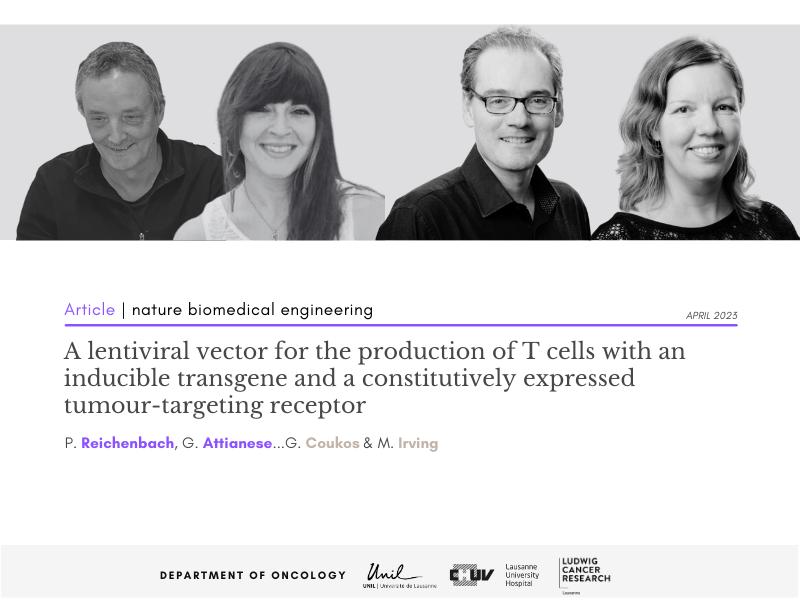
Recherche
Publication
Inducible Transgene and Targeted Receptor Lentiviral Vector for T Cell Production
Lentiviral vectors are a powerful tool for engineering T cells for cancer immunotherapy. By efficiently enhancing the abilities of T cells to recognize and fight cancer cells, optimized lentiviral vectors offer new possibilities for developing safer and more effective treatments.

The research*, published in Nature Biomedical Engineering, was conducted by the T cell engineering Group, led by Dre Melita Irving, one of the laboratories of the Human Integrated Tumour Immunology Engine (Hi-TIDe) of the Lausanne Branch of the Ludwig Institute for Cancer Research, which is directed by Pr. George Coukos.
The team has developed a dual inverted lentiviral transfer vector enabling efficient independent expression of two genes in T cells, along with a protocol allowing the production of high-titer lentivirus.
Lentivirus has been safely used to engineer T cells for cancer immunotherapy for well over a decade. In order to improve responses by solid malignancies, it is widely held that T cells must be coengineered to overcome barriers in the tumour microenvironment (TME). For example, T cell receptor (TCR) or chimeric antigen receptor (CAR) T cells can be coengineered to secrete immunomodulatory molecules that can either stimulate cellular function or block suppressive mechanisms in the TME. Ideally such molecules are only produced within the TME to prevent systemic toxicity, and this can be accomplished by placing the ‘gene-cargo’ under and inducible promoter. Here, they sought to develop an optimized lentiviral vector allowing the expression of a TCR or CAR (to redirect the T cells against the target tumor) along with independent inducible expression of gene-cargo of interest.
They accomplished this by developing a dual inverted transfer vector along with an accompanying strategy to augment lentivirus titers that ensures safety and quality.
The research was generously supported by Ludwig Cancer Research, an Advanced European Research Council Grant to G.C. (1400206AdG 322875), the Prostate Cancer Foundation, the Biltema Foundation, Cancera and the Swiss National Science Foundation to M.I. (310030_204326), the Lausanne University Hospital (CHUV), the University of Lausanne (UNIL).
*A lentiviral vector for the production of T cells with an inducible transgene and a constitutively expressed tumour-targeting receptor


